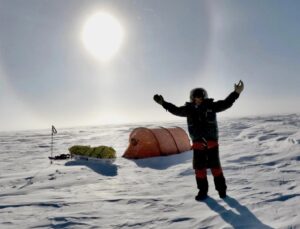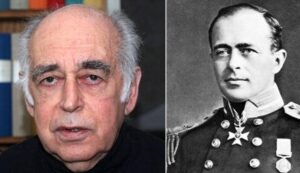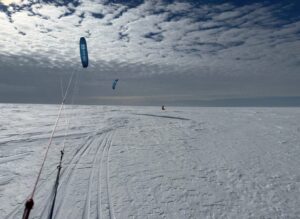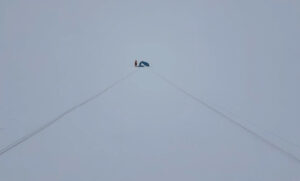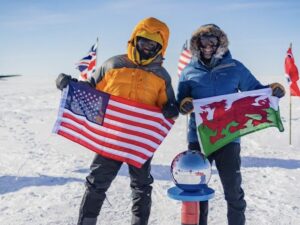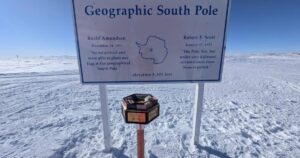ExplorersWeb caught up with Bill Hanlon as he prepares to leave on his next expedition: a 900-kilometre solo manhauling trek in Canada’s Northwest Territories. ”
Bill Hanlon is not a professional adventurer, but the Alberta, Canada family doctor has an adventure résumé that would put almost any pro to shame. For the past 35 years, the garrulous, Irish-born Hanlon has traveled an average of four months a year, in some of the most far-flung places on earth. He has recently trekked for 70 days through Afghanistan’s Wakhan Corridor, accompanied only by a Kirghiz horseman, a translator, four horses and two donkeys. Last winter, on his first solo expedition, he pulled a sled along Russia’s frozen Lake Baikal from south to north. The 700-kilometre journey took 24 days.
Hanlon, 63, travels not to set speed records or for personal glory, but to connect with the people who live in the villages he travels by. Largely supported by his Cochrane, Alberta family practice, Hanlon has set up an NGO called the Basic Health International Foundation that tries to improve medical services and living conditions in these tiny communities.
ExplorersWeb caught up with Hanlon as he prepares to leave on his next expedition: a 900-kilometre solo manhauling trek from Kugluktuk (formerly Coppermine) in Canada’s Northwest Territories to Gjoa Haven, in adjacent Nunavut. It’s part of a multiyear project to ski and walk the entire Northwest Passage, from Tuktoyaktuk to Pond Inlet – 3,300 km in all.
EW: How did you get started with this mix of philanthropy and personal adventure?
BH: My passion for remote communities evolved from recreating in them. I studied medicine in Dublin with a Tibetan and later worked with him at a tea plantation hospital in Darjeeling. We were dealing with emergencies like a 28-week-old premature baby in a hospital without electricity. He taught me how much could be done with limited resources.
The adventure is just play. The Foundation is the real work. And the adventure helps with that. Not many people will come to a talk on Multi-Drug Resistant TB. But if you work it into a presentation about a trek to an exotic part of the world, the message reaches a lot more people.
EW: What are some your notable adventures?
BH: I often wangled my way onto expeditions as the doctor. In 2007, I completed the Seven Summits. I was in no rush: it took me 20 years. In 2009-10, I joined a guided group that manhauled 1,200 km from Hercules Inlet to the South Pole. In 2014, four Norwegians and I skied 600 km across Greenland, from Kangerlussuaq in the west to Isortoq, on the east coast. The Wakhan Corridor has been particularly memorable. It’s a narrow strip 350 km long by about 60 km at its widest. Though part of Afghanistan, it separates Pakistan from Tajikistan. It took me years to get permission to go there. I couldn’t get the right documents from Kabul, so I eventually entered through Tajikistan. I’ve also done a lot in Ethiopia, South America and the Himalaya.
EW: What does your Foundation do exactly?
BH: We support simple ideas that improve life and medical care. We train midwives, nurses, community health workers – mostly women. (If you train someone as a doctor, they won’t stay in the community.) In the Wakhan Corridor, for example, one in five women dies during childbirth. Seven of eight kids in a single family can die from preventable infectious disease. In the eastern end of the Corridor, ninety percent of the people are addicted to opium.
Twenty years ago, we helped develop a weed in Tibet that provides a source of protein. And in those parts of Tibet with rickets [a Vitamin D deficiency], we encouraged mothers to have their kids sunbathe for 20 minutes a day, to produce the vitamin.
We’re also supporting a project to tweak Himalayan chickens genetically, so they can lay eggs at higher altitudes. Currently they only lay below about 2500 m. Above that, the villages get visits from chicken vans, but they’re much more expensive.
EW: What is the idea behind your upcoming Northwest Passage trek?
BH: I look at it as slow cooking. I want to savor the Passage and savor the people. I chose to do the middle section first because of the rich history of that area. I hope to do the 900 km in about 30 days – the pace I managed on Lake Baikal — but if I run out of time and have to stop halfway, at Cambridge Bay, then I’ll just do the journey in four or five years instead of three.
It’s a reconnaissance trip. A big part of my job is identifying local people who can work with us. Many of us are familiar with the distinctive medical issues up north: diabetes, suicide, food insecurity… and a 30-times higher chance of contracting TB. Mainly, I plan to just listen.
EW: You’re so well-travelled. Is there anything different about this journey?
BH: I took a firearms course so I can carry a gun for protection against polar bears. I’m used to being in politically dangerous parts of the world, but this will be a first for me.
Previous / Links:
Interview: Bill Hanlon highlights the health needs of remote communities
Expedition Watch: Northern Patagonia Ice Cap Crossing
Antarctica Wrap Up: Eric Larson, Dongsheng Liu and Bill Hanlon at the South Pole
“

